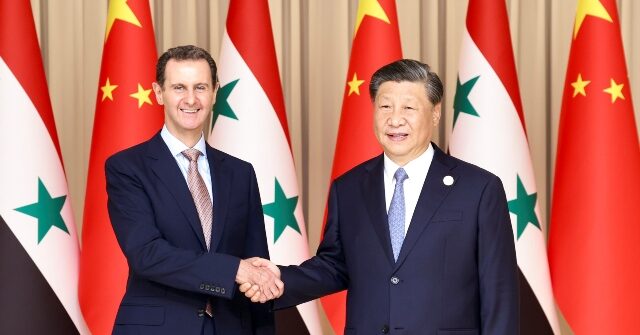We support our Publishers and Content Creators. You can view this story on their website by CLICKING HERE.

China’s envoy to the United Nations declared on Tuesday that Beijing is seeking to “play a constructive role” in the future of Syria following the fall of Chinese ally Bashar Assad.
The Assad family ruled Syria for over 50 years and, under Bashar Assad, waged a civil war against various opposition factions since 2011. The Assad regime fell on December 7 when Hayat Tahrir al-Sham (HTS), an al-Qaeda offshoot jihadist terror organization, entered Damascus, sending the dictator fleeing. A message alleging to be from Assad, now exiled in Russia, released on Monday claimed that Assad at no point resigned the presidency or chose to flee.
Assad’s regime held on over a decade of civil war through its connections with Russia and Iran. By extension, Assad maintained close relations to communist China. Assad last visited China in September 2023, seeking foreign investment and diplomatic support. Unlike Russia and Iran, however, China is not known to have provided military assistance to Assad, meaning it has never directly engaged in hostilities against HTS.
While China is not a major player in the Middle East, it has aggressively sought to elevate its profile in the region through its alliance with Iran. The Communist Party brokered a delicate diplomatic agreement between Iran and Saudi Arabia in 2023 and has been a vocal supporter of anti-Israel Muslim countries in the aftermath of the October 7, 2023, Hamas terrorist massacre in the country.
With Assad gone, the Chinese government, a regime currently engaging in a genocide of Muslim people within its own borders, demanded an immediate “stabilization” of the situation in Syria and suggested it could take on a greater role in bringing it about.
“Recently, the situation in Syria has undergone drastic changes, to which China pays great attention,” Chinese U.N. representative and former Foreign Ministry spokesman Geng Shuang told the Security Council on Tuesday. “It is imperative to stabilize the security situation.”
“We hope that Syria’s state institutions will remain operational to create conditions for the restoration of social order,” Geng said on behalf of his regime, calling for “regional countries” to help in “stabilizing the situation in Syria.”
Geng pronounced China also “ready to play a constructive role” to bring peace to Syria, without elaborating.
“The ambassador reiterated that China has long pursued a policy of friendship and cooperation with Syria, not interfering in Syria’s internal affairs, and respecting the choice of the Syrian people,” according to the state-run propaganda outlet Global Times.
The Hong Kong-based South China Morning Post, reporting on Geng’s remarks, noted that he did not specifically name HTS or address the call for cooperation directly to the al-Qaeda offshoot. He did, however, warn the new rulers of the country not to allow anyone there to organize terrorist activity against China.
“The Syrian territory must not be used to support terrorism or threaten the security of other countries,” Geng insisted.
The SCMP suggested that Geng’s remark was directed at reports that some Muslim members of the ethnic Uyghur population of occupied East Turkistan have joined the longstanding jihad in the Middle East. China claims that the Uyghurs, who dictator Xi Jinping has been attempted to eliminate through a genocide fueled by concentration camps and mass sterilization, run a terrorist organization called the “East Turkistan Islamic Movement” (ETIM). ETIM was once a U.S.-designated terror group but was removed from the list in 2020 on the grounds that no evidence suggested it existed.
The support that China may offer the new Syrian government is likely economic. China has dramatically expanded its influence in impoverished nations around the world through the Belt and Road Initiative (BRI), a global debt-trap scheme in which China offers predatory loans to poor countries to be spent on overpriced Chinese infrastructure projects. Chinese firms get paid to build the projects and, when the countries inevitably cannot pay the loans back, China uses its leverage to control the country politically.
Asia Times suggested, citing Chinese-language columnists, that China may be looking to expand the BRI into Syria. The original intent of the plan is to reconstruct the Ancient Silk Road, the legendary trade route connecting China to Europe through the Middle East.
“Some people think the collapse of Assad’s regime will hurt China’s interests, but actually the incident is a great opportunity for China,” the outlet translated an unnamed Hong Kong columnist explaining. “China’s interests will be hurt only if Syria becomes [more] chaotic.”
“By offering humanitarian aid, China can build a good relationship with the new Syrian government,” the columnist suggested. “China and Syria can have economic cooperation while China may contribute to the reconstruction projects there.”
Bashar Assad joined the BRI and publicly supported its expansion. During his last visit to China in September 2023, Assad hailed his financial ties to China and applauded Beijing for having “always aligned itself with international fairness and justice, and upheld international law and humanitarianism, playing an important and constructive role.”
The Chinese Communist Party has so far offered minimal commentary on the rise of HTS in Syria. Shortly before the fall of Damascus, the Foreign Ministry issued a statement on December 4 confirming that China’s embassy in Syria was operational and China was “closely following the situation in Syria and hopes that stability will return as soon as possible,” failing to take sides in the conflict and thus functionally abandoning Assad. After Assad fled, Chinese Foreign Ministry spokeswoman Mao Ning told reporters that China was not uniquely close to Assad, but “China’s friendly relations with Syria are for all Syrian people.”

 Conservative
Conservative  Search
Search Trending
Trending Current News
Current News 







